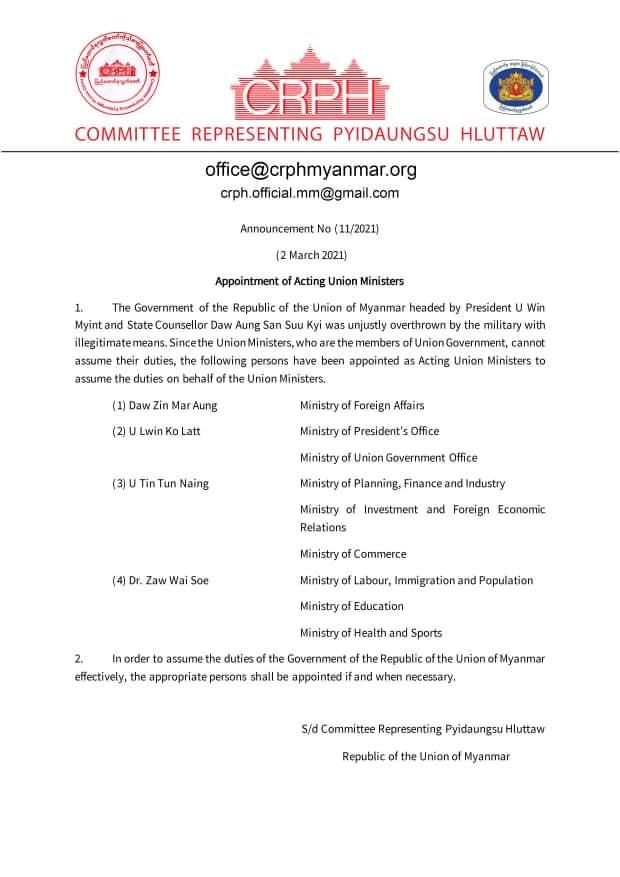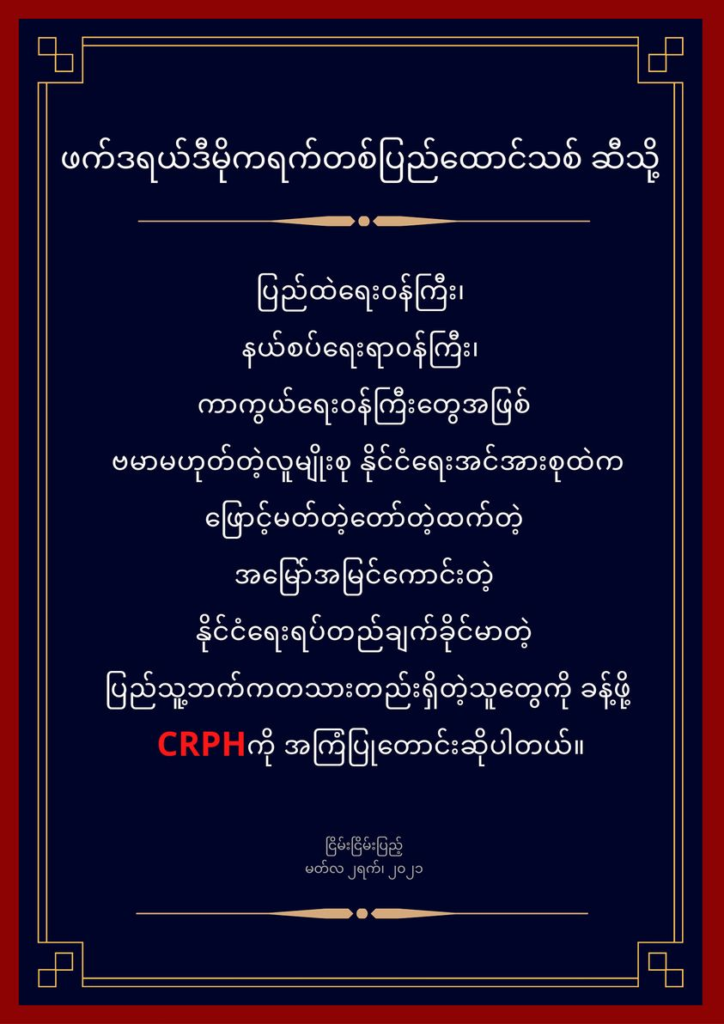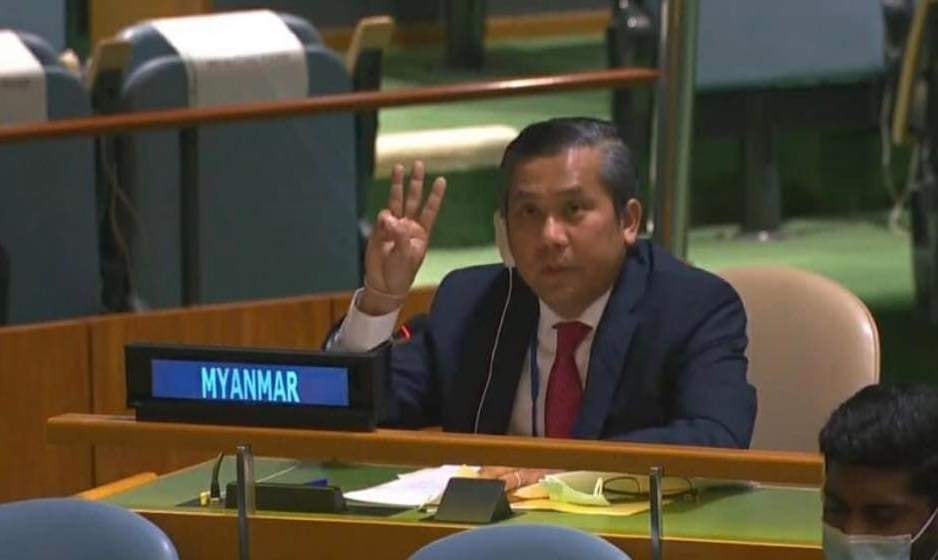Quite a lot has happened since the military coup of February 1, headed by General Min Aung Hlaing Commander-in-Chief of the military or Tatmadaw.
Almost immediately after the coup on February 3, staff at 70 hospitals and medical departments across Myanmar stop work to protest against the coup, spearheading the civil disobedience movement (CDM) which now involved education, banking sector and almost all government institutions, propelling one of the most effective anti-military-dictatorship of the country.

By February 4, a group of protesters waved banners and chanted anti-coup slogans in Mandalay in the first such street protest against the army takeover, which by February 7 have become countrywide covering many middle to large cities across the nation.
On February 9, a woman was shot in the head in Naypyitaw where massive rallies were held. She died ten days later because of the wound. Again on February 21, two men were killed in Mandalay as security forces fired to disperse protests.
On February 28, which was a countrywide general strike, at least 25 were killed across the country and hundreds wounded as security forces used live ammunition and deployed snipers, either to take out what they considered to be the leaders or simply to frighten, cow the mass into submission and abandon the rallies.
“As of March 2, a total of (1294) people have been arrested, charged or sentenced in relation to the military coup on February 1. Of them, (4) were convicted; (2) to two years imprisonment, (1) to three months and (1) to seven days. (61) have been charged with a warrant and are evading arrest, (306) were released. A total of (988) are still under detention or have outstanding charges/evading arrest, including the (4) sentenced. Up until now, approximately (30) people have been killed due to the violent and arbitrary crackdowns,” according to the Assistance Association for Political Prisoners (AAPP).
On March 1, Committee Representing Pyidaungsu Hluttaw (CRPH) Announcement No (10/2021) declared the coup junta’s State Administration Council (SAC) a “Terrorist Group”.

“Due to the atrocities and acts of terrorism of the military, the streets and communities across Myanmar have become battlefields. There have been many civilian fatalities and the life, liberty and security of the people are under constant threats due to the acts of terrorism committed by the illegitimate military council,” writes the announcement.
The following day, on March 2, its Announcement No (11/2021) appointed four Acting Union Ministers from National League for Democracy (NLD) elected MPs of November 8, 2020, general elections, to Ministries of Foreign Affairs; Presidential Office; Union Government Office; Planning Finance and Industry; Investment and Foreign Economic Relations; Commerce; Labour, Immigration and Population; Education; Health and Sports.
“In order to assume the duties of the Government of the Republic of the Union of Myanmar effectively, the appropriate persons shall be appointed if and when necessary,” writes the March 2 announcement.
Meanwhile on February 22, its Announcement No 7 and 8 appointed Htin Lin Aung as CRPH foreign relation representative and Dr Sa Sa to represent CRPH as special UN diplomat respectively.
On February 26, UN Ambassador for Myanmar Kyaw Moe Tun gave a speech at UNGA, New York where he sided with the CRPH and appeal to the world to help Myanmar overcome the junta’s rule. The next day he was dismissed by the junta. But according to the procedure he is to go on serving as UN Ambassador until September. Besides, the question of whether the SAC will be accepted as the country’s government is not yet decided in the UN.

On February 28, with the Announcement No (9) the CRPH applauded Ambassador Kyaw Moe Tun for endorsing it and also rejected the SAC dismissal order, stating that his status as people’s representative wouldn’t have any legal effect whatsoever.
Given such development the question arises what kind of enforcement mechanism the CRPH has to back up its acting government to be operational in a true sense, if not exactly a formidable one.
The pundits have been busy picking up the idea which was left by the NLD prior to the February 1 military coup of forming national unity government again. And now that the Tatmadaw has been declared a terrorist group, the acting CRPH government is left with no security force, army and police, to govern.
The suggestions vary from forming alliance with the ethnic armed organizations (EAOs), which have their own controlled areas and administrations, and ethnic political parties (EPPs) to integrating their leaders into the acting government to facilitate national unity. Some even go so far as to suggest that the home, defense and border affairs minister portfolios be given to the non-Bamar ethnic nationalities.
Of course, it is a tall order and nobody knows if the junior NLD functionaries that now lead the CRPH will have that kind of authority or vision to overcome their party’s unwritten Bamar supremacy tendency, since most of their leaders and MPs are in junta’s custody.
And another pressing question is also the doing away with the military-drafted 2008 Constitution, which the EAOs and EPPs see as crucial and are demanding it, to be replaced with a genuine, acceptable federal union Constitution.
Either way, many experts and observers are of the opinion, or even convinced, that the CRPH won’t be able to pull this task of wrestling back the political decision-making power from the junta single-handedly.
For now the CRPH can count on the sympathy and backing of the UN Secretary-General António Guterres and even his Special Envoy on Myanmar Christine Schraner Burgener, including the US newly imposed sanctions on Tatmadaw top brass and followed by the EU.
But this struggle could be prolonged and in that sense the acting government will need all the help it can gather from all quarters. And it goes without saying mobilization of inner strength comes first before one can tap in on the outside sources, which may or may not come easily.
The CRPH must now make a profound choice if it wants to succeed there is no other way than forging a national unity government.











Leave a Comments